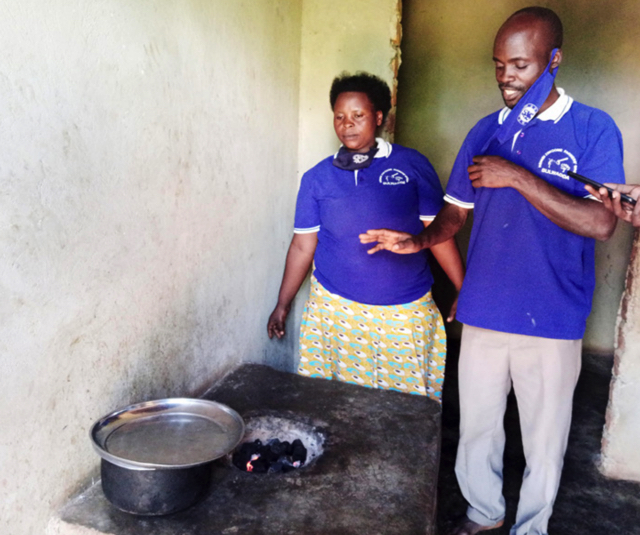
But the cost remains high for most households
Kampala, Uganda | ISAAC KHISA | A new solar energy project is using green technology to improve lives of isolated villages living far beyond the reach of Uganda’s electricity grid.
The Gomba District Farmers Association members have relied on firewood to cook and warm their homes for many years in this remote part of the country causing deforestation and soil erosion.
But the residents are now cooking their matooke and stews on solar-power cooking stoves and installing solar lighting as part of a 5-year project led by Food and Agriculture Organizations of the United Nations dubbed Global Climate Change Alliance (GCCA) Plus.
The US$10million project supported by the European Union is benefitting nine cattle corridor districts including Gomba to improve knowledge and institutional capacities for gender-responsive climate change adaptation and mitigation and improve household income and climate resilient livelihood capacities in a gender-responsive manner.
Mary Nakato, a small-scale farmer in Bulwada village in Gomba District using solar-powered cooking stove now uses one bag of charcoal for cooking meals for three months for her family of 12 people compared to less than a month before.
“The source of the energy is also clean and cook meals faster compared to the traditional charcoal cooking stoves,” she told a team of FAO during a field visit on March.03.
Having used the solar powered cooking stove for nearly four years without breakdown, Nakato says many residents are now yearning for the same technology in their homes.
Meanwhile, Nelson Ssali, a resident of Bunyinywa village said his family no longer cut down trees and some of their coffee to use them as wood fuel.
“This has meant that we are no longer threatening our income,” he said.
The Gomba association promotes two kinds of solar powered cooking stoves –portable and non-portable – so much so that they have become so popular in saving the villagers pressure of searching for firewood and contributing to environmental protection.
The stoves are also claimed to save women and youth from the raving smoke-related respiratory and optical diseases.
The solar power cooking stoves use majorly volcanic stones to produce heat and energy, with the inbuilt air system said to be assisting in keeping the stones burning. Once lit, the charcoal burns slowly and the heat is transferred to the stones that becomes red with the help of air system or fan and the amount of heat controlled by the dimmer switch. The stove is designed in such a way that it uses less charcoal and more stones.

Adoption remains low
However, the uptake of this technology remains low because the stoves are expensive and majority of the population cannot afford.
FAO officials say, the cost for the solar powered cooking stoves range between Shs500,000 to Shs 1.5million and that access to materials used to make the stove is limited.
FAO’s Program Coordinator, David Kintu, said the beauty with the new technology is that it reduces smoke, minimises charcoal usage and hence helps restore the environment and combat climate change.
Elsewhere, Nyai Women’s Group in the poverty stricken Maracha in Uganda’s West Nile region are making energy saving stoves that can use little wood compared to the ordinary stoves.
With support from FAO’s Climate-Resilient Livelihood Opportunities for Women Economic Empowerment (CREE) in the Karamoja and West Nile regions, the women produce about 25-30 stoves monthly.
Eunice Ezajoro, the chairperson of 25 member Nyai Women’s Group told The Independent in an interview that the residents who have embraced the energy saving stoves are protecting the environment.
“Like the rest of the members in this group, I have reduced on the number of times I used to go to collect firewood,” she said “and now instead of going or sending children to collect firewood twice or thrice a week and the associated risks such as sexual abuse, I now go once a week, enabling us to have enough time to engage in other home chores and thus increase on our household incomes.”
However, Ezajoro said while the group plans to produce 100 stoves per month and involve other stakeholders in marketing the stoves, it lacks adequate capital to purchase raw materials. To make the situation even worse, the current 5-year US$8.9million Swedish funded project that has seen Nyai Women’s Group benefit is expected to end next year.
These developments come as Uganda plans to join the rest of the world to commemorate the International Day of Forest on March 21, 2022 to raise awareness of the importance of all types of forests.
The National Environment Management Authority report for 2018/19 indicates that while all the country’s natural forests have experienced a strong decline in the past decades, from 23.8% (4.8 million ha) in 1990 to about 9.9 % (2 million ha), plantations registered an increment between 2010 and 2017 from 3% to 8%.
Forest loss especially in natural forest has mainly been due to conversion of forest to agriculture, especially in Amuru, Masindi and Hoima districts for sugar cane production.
****
 The Independent Uganda: You get the Truth we Pay the Price
The Independent Uganda: You get the Truth we Pay the Price


